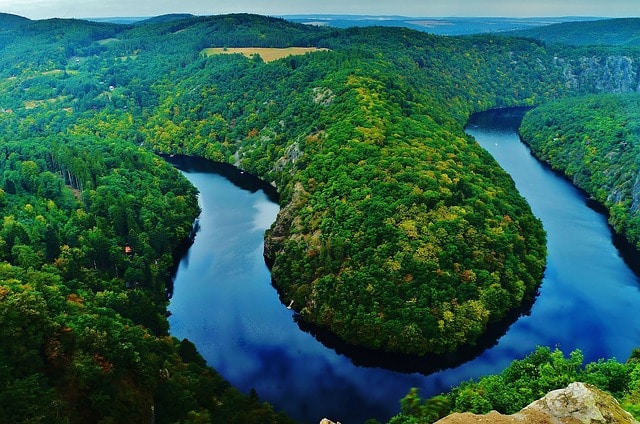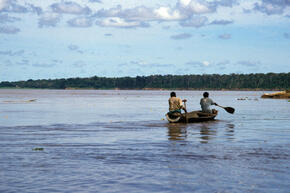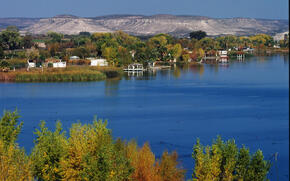FRESHWATER
Protect fresh water sources

Protect fresh water sources
 All life needs water. It is the world’s most precious resource, fueling everything from the food you eat, to the cotton you wear, to the energy you depend upon every day. Freshwater habitats—such as lakes, rivers, streams, wetlands and aquifers—house an incredible proportion of the world’s biodiversity: more than 10% of all known animals and about 50% of all known fish species. Yet despite the massive role water plays for people and nature, it is a surprisingly finite resource. Less than 1% of the world's water is fresh and accessible.
It’s also threatened. Climate change, population growth and changing consumption patterns are just a few of the myriad forces putting freshwater systems increasingly at risk. Freshwater species are declining at an alarming rate of 76%—much faster than terrestrial or marine species—and freshwater habitats are in worse condition than those of forests, grassland or coastal systems.
Protecting fresh water cannot happen alone. WWF partners with governments, businesses, international financial institutions and communities to ensure healthy freshwater systems exist to conserve wildlife and provide a sustainable future for all. Together, we can create a water-secure future.
All life needs water. It is the world’s most precious resource, fueling everything from the food you eat, to the cotton you wear, to the energy you depend upon every day. Freshwater habitats—such as lakes, rivers, streams, wetlands and aquifers—house an incredible proportion of the world’s biodiversity: more than 10% of all known animals and about 50% of all known fish species. Yet despite the massive role water plays for people and nature, it is a surprisingly finite resource. Less than 1% of the world's water is fresh and accessible.
It’s also threatened. Climate change, population growth and changing consumption patterns are just a few of the myriad forces putting freshwater systems increasingly at risk. Freshwater species are declining at an alarming rate of 76%—much faster than terrestrial or marine species—and freshwater habitats are in worse condition than those of forests, grassland or coastal systems.
Protecting fresh water cannot happen alone. WWF partners with governments, businesses, international financial institutions and communities to ensure healthy freshwater systems exist to conserve wildlife and provide a sustainable future for all. Together, we can create a water-secure future.
 people in dugout canoe, Amazon, Peru
WWF seeks to change how water is managed around the world. We encourage states relying on the same river to better coordinate their shared freshwater resources, and we advocate for water security in sustainable development. We also help strengthen the effectiveness of river basin management organizations so they are empowered to protect the natural capital of river basins and ensure climate-smart governance. By partnering with multilateral institutions and global influencers like the Global Environment Facility (GEF), we can bring our holistic management and policy solutions to scale. We also push governments and others to place water higher on global and regional agendas to ensure that freshwater ecosystem integrity is considered in decision making processes. One way we work towards this is through our Basin Report Card Initiative.
people in dugout canoe, Amazon, Peru
WWF seeks to change how water is managed around the world. We encourage states relying on the same river to better coordinate their shared freshwater resources, and we advocate for water security in sustainable development. We also help strengthen the effectiveness of river basin management organizations so they are empowered to protect the natural capital of river basins and ensure climate-smart governance. By partnering with multilateral institutions and global influencers like the Global Environment Facility (GEF), we can bring our holistic management and policy solutions to scale. We also push governments and others to place water higher on global and regional agendas to ensure that freshwater ecosystem integrity is considered in decision making processes. One way we work towards this is through our Basin Report Card Initiative.
 Mekong River Fishermen
Every river has a source. From its birth place—usually a snow-covered mountain peak or thick forest—a river will pass through rural communities, densely populated cities, business parks and farm lands before reaching the ocean. WWF embraces a holistic basin-wide approach to address the variety of threats to fresh water. We work on the ground in key rivers basins around the world, supporting responsible water use and infrastructure, and testing and implementing innovative solutions. We bring to bear our climate and hydrological expertise, relationships with private and public sector influencers, academic partners and extensive global network to strengthen the resiliency of freshwater systems. Learning from our experience on-the-ground, we also seek to develop and share tools, techniques and knowledge globally.
Mekong River Fishermen
Every river has a source. From its birth place—usually a snow-covered mountain peak or thick forest—a river will pass through rural communities, densely populated cities, business parks and farm lands before reaching the ocean. WWF embraces a holistic basin-wide approach to address the variety of threats to fresh water. We work on the ground in key rivers basins around the world, supporting responsible water use and infrastructure, and testing and implementing innovative solutions. We bring to bear our climate and hydrological expertise, relationships with private and public sector influencers, academic partners and extensive global network to strengthen the resiliency of freshwater systems. Learning from our experience on-the-ground, we also seek to develop and share tools, techniques and knowledge globally. Rio Conchos, Chihuahua Desert, Mexico
WWF has collaborated with local stakeholders and governments in critical river basins around the world to assess climate change vulnerability and plan interventions. Because institutions are central to the way water resources are managed, WWF has also engaged institutional partners to investigate how to most effectively adapt to climate change. By both working in the field, where many impacts are already being felt, and partnering with institutions, which influence water management decisions, we hope to safeguard a future where both human and environmental needs are met. We are particularly focused on building water security in the face of climate change in Asia's High Mountains and in the Chihuahuan Desert.
Rio Conchos, Chihuahua Desert, Mexico
WWF has collaborated with local stakeholders and governments in critical river basins around the world to assess climate change vulnerability and plan interventions. Because institutions are central to the way water resources are managed, WWF has also engaged institutional partners to investigate how to most effectively adapt to climate change. By both working in the field, where many impacts are already being felt, and partnering with institutions, which influence water management decisions, we hope to safeguard a future where both human and environmental needs are met. We are particularly focused on building water security in the face of climate change in Asia's High Mountains and in the Chihuahuan Desert.